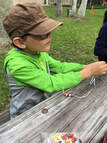|
Talking About
Florida Homeschooling... Evaluations and More |
A good evaluator works for the parents, assisting them in meeting legal requirements and in supporting them when districts overstep their bounds." |
Getting Your Homeschooled Child into College I've been part of a few recent conversations on getting a child into college. One in particular revolved around how to get into the University of Florida which rejects a lot of applicants. For over seven years, I was a volunteer interviewing applicants for the admissions committee of a top university with a very high rejection rate. I interviewed many students who applied and most were not accepted. I attended a seminar led by the Dean of Admissions for volunteers and a select group of parents who were trying to get their students admitted. So I know something about the process from the other side. There are several things to take into account here.
1. Derailing Themselves--Or Finding the Right Match Some students that I interviewed derailed themselves and caused me to report to the University of Chicago that the particular students did not belong with us. Why? Our university has a reputation for being a school with high intellectual standards and lots of students who love to read academic materials and debate philosophy and spend time in the library. It is a school that rejected serious sports decades ago when a university president concluded that staying at the top of the Big Ten would mean lowering academic standards in order to admit better athletes. He felt he had to decide whether sports or academics would be our priority and he chose academics. We had a reputation for focusing on theory and not practicalities. Those were reputations that the university wanted to keep. So when a student told me he wanted to come to our university to learn hands-on, I knew he would not be happy if admitted and the university didn't want someone who would be unhappy with them. Or when one mentioned only reading materials that were assigned for classes--even during the summer, he was not a good fit for a school that wanted intellectually curious students. These hadn't researched our reputation and wanted something that we were not. Every college or university has a "personality" and a type of student that they are looking for who will fit with the institution's culture. Some are known as party schools. Others are sports schools. Or have some other personality. And while a few students get in who don't fit that personality, most won't. Our Dean explained that finding a college is much like finding a marriage partner. You have to want that person's personality and they have to want yours. If you try to get together with someone that doesn't have the qualities you want and doesn't want what you offer, it's not likely to work--neither of you will be happy. Research a college thoroughly and know what they want and decide if you want to be a part of that and want to show them what they are looking for. Make sure you will be happy with them. They reject a lot of people who aren't really a good fit because they know those people will be unhappy, complain about them, more likely to cause trouble and not graduate. This is especially true if you want a big name college rather than a local community college. 2. Check Out their Requirements Colleges and universities have not only general admissions requirements posted online, but most also have a list of specific requirements for homeschooled students. Research those to see what classes and other things the institution of your choice requires. If your child is just starting high school and has no idea where he wants to go, using the Florida public school graduation requirements, especially the 24-credit track with the scholar designation, can be helpful even though homeschoolers aren't required to use public school graduation requirements. Sometimes, they'll admit students missing a requirement or two--especially if you have an explanation for the missing requirement, but don't trust that they will make an exception for you. Does this mean that you have to do things just like the public schools? No. Study math and science, social studies and English, but feel free to study from a different angle--unschooling or using unit studies can work great. Studying chemistry by investigating soap and creating hundreds of bars of soap from different recipes and analyzing in detail their varied chemical compositions and the effects of those can work well instead of a typical chemistry class. Running a business and keeping detailed accounts and figuring out how to increase business and lower expenses can be a great alternative to a typical economics course. Or studying the history of a particular region of the world or of a particular movement can work instead of studying the history of the entire world. And so on. These can look like the sorts of classes innovative schools offer and can help be better than copying what public schools offer. On the other hand, don't skip math (or some other subject) for years and expect your child to learn enough in a year or two to do well on the SAT or ACT or other entrance exam. Learning steadily and reading a lot tend to pay off in the end when time for testing. 3. Stand Out from the Crowd My university had (and still has) a very low acceptance rate. Most people were rejected because so many more applied than they had room for. But most of the students who applied looked practically the same on paper. Their test scores were high and our university regularly rejected applicants with perfect scores. Their classes all sounded pretty much the same. This is where homeschoolers can shine by doing something different, though too many try to copy schools and end up being just like everyone else. Yes, study the core subjects but do other things, too. Let your child take some classes that he's interested in. Or create classes for him. Let him explore his interests in detail and either put them together as a class or list them as an extracurricular activity. A student who has a class or extracurricular activity for something like Fencing or Renaissance Music or on a specific academic topic such as "An in-depth study of medical and societal responses to pandemics of the past," or something else unusual will stand out in a good way. A student who wants to be a scientist and has volunteered in a lab, or studied works of other scientists on a particular topic, subscribes to scientific journals, or has taken other steps to show that he's actually looking like a scientist already is another great way to stand out from the crowd--and this can be adapted to any major and/or career path. 4. Testing If your child wants to get into a top school, test scores are important but not as important as many think. Students with top scores are rejected every year. Why? They usually have put so much time and energy into studying and test scores that they haven't put time into other things. When someone takes the SAT more than four times, a university sees that as being somewhat paranoid about testing. They want to see time put into other more productive things, too. They want to see extracurricular activities and passions. They want to know that the student has a way to be part of the community and de-stress so the student will be less likely to have a mental breakdown. So, yes, put time into preparing for a major college entrance exam, but then take the test no more than 4 times, and move on to other things. 5. Diversity Top universities are very concerned about diversity. Most who hear this think of racial and ethnic diversity and those are important to them, but diversity comes in many varieties. It can mean the school your child comes from, the town or county the child lives in, the family's economic status, and a lot more--they want to see students from a variety of these. If your student has a passion for something unusual, that can help. Being heavily involved in a sport like archery or lacrosse or kickball or something less typical or or playing an instrument, particularly something different like the accordion or a recreation of an ancient instrument or becoming very involved in promoting a charity or helping the community in some way, etc. can be good. Universities like kids who are passionate about something because they hope they'll come and get involved at their school and even create a club if there isn't one currently. They hope they'll add to the activities on campus that make for a rich campus life. 6. Proven Success This is a big one. Colleges and universities want to be able to later have successful graduates whom they can claim as proof of their success. How do they manage to get graduates how will be a success and reflect well on them? By looking for signs of success in what your student has done so far. An example of what can help: My daughter asked me three years ago if she could go to an expensive summer camp that began in Colorado and ended at the Pacific Ocean in California. This was not in our tight budget. But she begged and said, "If I can get the money for it, can I go?" I agreed. She called the camp and asked for a discount. Then she researched and found organizations that help fund camp and asked them for help. She asked our congregation for help and soon she had enough to cover the costs of the camp, air fare, and spending money, and off she went to the camp. A year later, she repeated the story when she asked about going to a summer camp that flew to Europe and then to Israel and she funded it. This story, told in a college application essay, would be very helpful in getting into a college or university because it shows that when she put her mind to doing something, she networked and researched and did what was needed to make it work. Other examples could include seeing a need for something in the community and working to create it. Organizing and leading a student group or a charity group. Running a business. Eagle Scout projects. And so on. 7. Follow Directions/Expectations The people on a college admissions committee are people. They get tired and annoyed, especially after looking at thousands of applications which mostly look very much alike and knowing that they have to weed out a huge percentage of them. They are looking for reasons to throw files on the reject pile. Sometimes it doesn't take much to get on that reject pile. Examples that I've heard of include applications that are too long because the transcripts are not the standard one-page document. Two pages might be tolerable but more than that may be too much for someone tired at the end of a day. Including documents that weren't asked for can be another. One unasked-for page might work, but sending a ten-page list of course descriptions that the institution did not ask for could easily get it thrown into the reject pile. Give them the information they want without giving them extra and your chances of getting rejected go down. 8. Ask For More Some colleges give an option to request an interview. Unless your child really can't handle an interview (and that could be fixed by practicing a lot--which will help later with getting a job), take that option. It will give the institution a chance to get to know the student better and fill in information that they are lacking because they don't have a profile for their school to refer to. It gives your student a chance to brag about his accomplishments and show off the intellectual reading the student has done, or the plans he has for the future and how the institution fits in those plans, etc. If the college has an optional essay, write the essay. Use it to highlight how homeschooling has made you a better student and given opportunities for success, or about your accomplishments and why you are a perfect fit for their institution and what you can do to be a vital part of their college or university, etc. Research to be sure that you are understand their culture and what they are looking for so you don't undermine yourself. Do brag and be a salesman for yourself. Do come with a few questions about their institution--enough to show you are very interested but not ones that make you sound clueless. 9. Fixing Problems Some students, especially those who came out of a bad school experience, may start homeschooling with a history that includes some bad grades. If the problems were only in ninth and tenth grades and the student has moved on to more advanced courses and does well, colleges may actually see this as a positive thing, especially if the student writes an essay explaining what the issue was and how the student overcame it. This can be evidence of proven success and overcoming a bad background that can help a college or university look good. Colleges will not be as willing to accept a student with failing grades in 11th or 12th grades, though, as they expect students to be less mature in 9th and 10th grades, but by 11th grade, they want to see a student on his or her way to doing well in school. One option for fixing such problems is credit recovery. Public schools do this and homeschools may, too. Credit recovery means that the student retakes the class, and the new grade is used to replace the previous lower grade. If a number of classes have to be repeated, it may mean delaying graduation a year or two, but the better foundation in academics is likely to help the student get through college and in adulthood, few people will ask (or care) how old the student was at graduation. Another option for credit recovery could be to use tests such as the CLEP tests to show that the student has learned material and deserves a better grade. And use that new grade on his or her transcript. Likewise, if the student wants to gain credits for classes not taken, without having to sit through a class that he or she has already learned about, CLEP or other tests can be used to prove that the student should have credit for a particular class. Sometimes, a student may be far behind in earned credits but knows the material and wants to get to graduation. Or the student may just be ready to graduate and move on to college (and doesn't want to use dual enrollment or isn't eligible for it). Taking and passing a GED practice test can be used as proof for granting a homeschool diploma and allowing the student to skip taking classes. Taking the actual GED test can be an option, too, ending with a state-issued diploma, though a diploma (even a homeschool one) is often a better option than getting a GED. 10. Transferring Florida has a lot of great programs. Many homeschooled students start with college credit in high school through the state's dual enrollment program for earning free (paid with our tax dollars) college courses. These credits may not transfer to a top college, BUT they will prove to them that your student is capable of doing college-level work and can be very helpful in getting your student admitted. AP or CLEP test scores can also be helpful--even if the school doesn't accept them because they, too, can show that the student can perform at the college level. In addition, if your child begins as a degree-seeking student at local college, it may be easier to then be accepted by a better school after a year or two of college elsewhere. Colleges and universities are almost always easier to get admitted to as a transfer student than as a Freshman, and in the end, where you get the final degree from is what will show up on your diploma. In Florida, if a student earns an AA at one state college, their credits should all transfer to a college or university within the state system and the state guarantees acceptance at a college or university within the state system (not necessarily a specific institution of your choice, but definitely to one of the state system institutions). So transferring from a local community college to a bigger university can be a smart move. 11. College is College I went to a top academic institution. One of the most expensive in the country. A few times when I've walked into a job interview, I've been treated differently because of it because those who work in academics recognize its name. But others with a community college degree have walked in and gotten the same jobs I have. In some fields the institution name matters more than others. In most fields, though, a degree is a degree. I've not seen a single homeschooled student who couldn't get into college when that's what the student wanted. I've helped some get into big name schools like Stanford University. And I've helped some get into colleges after some intense unschooling that didn't resemble a typical high school program at all. But all got in. If you really want an intense academic college, planning for that early on can help a lot, but a student who isn't an intensely-academic student won't be happy there and won't be likely to succeed; going to a community college may be a much better path for that student. Picking a path that works for your child is what most of us were doing when we chose homeschooling. If you stick to that idea for college, your student shouldn't have trouble getting in to college. Cheryl Trzasko [email protected]
0 Comments
Your comment will be posted after it is approved.
Leave a Reply. |
Archives
April 2024
Categories
All
|

 RSS Feed
RSS Feed






